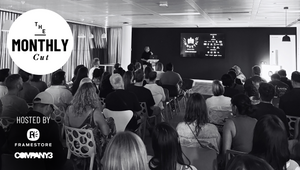
Air NZ Takes a Magic Leap with Framestore

As I tower over the craggy islands of New Zealand, a flock of tiny seabirds is soaring round my head – they swerve and meander as I try to brush them away gently with my hand. I’m like a 21st century Gulliver. I plunge my head below sea level to gaze at the shoals of miniscule pink fish sloshing around the Tasman Sea.
It’s 9am at Framestore’s fancy new headquarters on London’s Chancery Lane and I’m feeling whimsical. It’s not a word I care to use if I can help it, but, dammit, the teams at Magic Leap, Framestore and Air New Zealand have broken me down. They’ve invited me down to try out their experimental mixed reality board game, ‘Fact or Fantasy Game of New Zealand’. It’s a quiz show, hosted by a kiwi called Pete, and it plays out over a huge 3D printed map of the country. Bilbo Baggins pops out of a hobbit hole to watch a firework display. A sperm whale leaps over South Island. Adrenaline addicts paraglide through the clouds and bomb about the waters in a speedboat. Yep, definitely feeling whimsical.
The game represents an experimental first – not just for Air New Zealand but for the air travel sector. Jodi Williams is the general manager of global brand and content at Air New Zealand and she says that the project came about following an introduction to Magic Leap via Sir Richard Taylor, the founder and creative director of New Zealand’s Weta Workshop.
“We were very impressed with what we were seeing and could definitely see a link to travel,” says Jodi, who immediately leapt on the potential. “We’re always looking for ways to stand out, it’s an ever-cluttered marketplace. And with one eye on the future, we were very excited about the potential for onboard the aircraft… we didn’t know what that looked like specifically, but could actually see what this could do.”
Magic Leap hooked Jodi’s team up with Framestore, who have been working with the Magic Leap team in Florida for about three years on building up a creators’ toolkit and helping to push the creative potential of the tech forward.
Jodi and the designer Geoff Suvalko, who she regularly collaborates with, quickly hit on the idea of using the Magic Leap technology to create a new kind of board game. They were inspired by the idea of family holidays and initially envisioned a game board inside a physical camper van. From then they worked with Robin Carlisle, global head of creative at Framestore Labs, to develop an experience.
Once the idea of creating a game had been established, it took the Framestore team less than 16 weeks to develop the experience. As Robin explains, one of the benefits of a mixed reality experience over VR is that you don’t need to build a full computer-generated environment. It saves time and allows creators to focus on the design and animation of the characters and to devote more energy to the creative challenges.
One of the selling points that a mixed reality device like Magic Leap or its Microsoft-owned rival HoloLens is the potential for a collaborative experience. Users are not locked away from the real world and it’s relatively easy and intuitive to get involved. It reminds me, I mention to Andy Lanning, executive creative director at Magic Leap, of the way in which the Wii broadened the appeal and accessibility of gaming.
“It’s something we’ve tried to emulate, that intuitive flavour you got with Wii Sport, that out the box game that anybody could use. We’re using the partnerships to familiarise people with what we’re doing in a really painless way - ultimately we want people to start buying these devices in the future,” says Andy.
“We’ve always said what we want to deliver in mixed reality is very much like a board game. You can get up, you can leave the room, you can have a conversation – it doesn’t ruin the experience. And that was something we were talking about five years ago and now we’ve got a use-case that says, ‘yeah’,” says Andy. (At this point we have a brief sidebar about the potential for Magic Leap and Dungeons and Dragons. Andy is also a comics writer and artist, so things get quite enthusiastic.)
Magic Leap does, however, have its constraints as a platform. The headset is essentially a mobile device, so rendering super intricate textures is out of the question – instead the detail and realism goes into the movement and animation. Another challenge is anchoring these digital elements in the real environment. The headset is calibrated so that it can position itself within the 3D space, while eye trackers follow a user’s pupils and allows characters to make eye contact. In the case of the Air New Zealand game, the experience has been fed with the digital file of the 3D-printed map. That then allowed the team to give their characters shadows that map naturally across the mini mountains and beaches of the game board’s topography. All of that precision plus a carefully considered approach to responsive, three dimensional sound design help give the fantastical elements weight.
For the team at Magic Leap, partnerships with brands like Air New Zealand not only give them a chance to showcase the technology, they provide valuable insight and ideas that can then be fed back into the development of the technology.
“These projects potentially have an impact of where we go with our technology,” says Andy Lanning, executive creative director at Magic Leap. He tells me about the breakneck evolution of the technology over the past few years. When he started collaborating with Framestore, he reminisces, Magic Leap wasn’t the lightweight headset that we’re playing with today – it was a machine the size of a ‘double refrigerator’ called ‘the Beast’. The tech has been developing – and still is – as fast as content is created for it. “These past four years you can liken to driving in a Formula One race while you’re still building the car. Oh what? We need brakes?” he laughs.
“We were always learning about something that was always going to be eventually replaced. So you’d figure out how to get the best out of it and then they’d pick it up and take it away and give us something different that would work in a different way with different challenges,” Robin joins in. And it’s easy to see how the headset that we’re currently playing with will soon be replaced by something more discreet.
It's not just Magic Leap and Framestore who are looking to the future of mixed reality. Having experimented with the boardgame, Jodi is now looking at how Magic Leap might be deployed aboard the Air New Zealand fleet. It could, she says, help provide mindfulness-based experiences for people who are anxious about flying. It could replace the traditional seat back screens – great for anyone who loves to watch embarrassing films when they fly. Air New Zealand is known for its ambitious safety videos and Jodi says that the team has even talked about how mixed reality might transform safety instructions.
The Fact or Fantasy game represents a stone dropped in a pool of water, sending out ripples. Because in order to bring mixed reality into their aircraft, Air New Zealand will have to collaborate with manufacturers like Boeing and Airbus. Negotiating with them and nudging them from their comfort zone is not always the easiest thing to do, but once Jodi’s team have broken that ground, it will then become easier for less adventurous airlines to follow suit.
Indeed, not all brands are set up for innovation in the way that Air New Zealand is. You’d think, for example, that it would be a tough internal sell to pitch an experiment with a new, relatively untried technology. There’s a lot of trust.
“They still haven’t seen it! Yes! Our CEO keeps saying, ‘sounds amazing Jodi… can I see it?’” laughs Jodi. The game premiered at LeapCon in Los Angeles in October and it’s now in London – and it’s only heading to New Zealand in January. It’s testament to the culture of openness and trust – in recent years the airline has debuted a number of experimental products, from an economy couch to a tracking band for unaccompanied minors and an AI brand ambassador. “We’ve got a track record when it comes to innovation and having an open mind as a brand. We’ve got one eye on the future. In that regard it was an easy sell. On the other hand, you really have to bring people on the journey and explain a technology that you’re only really learning yourself at the same time.”
Back to the game board and Pete the kiwi is totting up the points. I may feel like a relative giant, looming over the map of New Zealand, but my pool of Kiwi trivia is obviously fairly miniscule. Jodi is the joint winner with Framestore’s Steph Bruning, who is getting quite competitive. I’m almost tempted to ask for a rematch, but the team from the BBC has just arrived. But, with Christmas round the corner and the inevitable family board game bust-ups, this has been a tantalising taster of the future of communal gaming.















